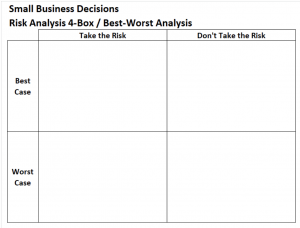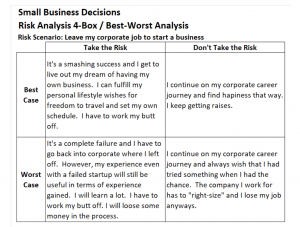How Can I Do That?
As a leader, making decisions is a way of life. And, often as not those decisions affect others and their leadership. This post is intended to provide you, the leader, with a useful tool in making your leadership decisions.
If you do not want the context on the next page or two from where this tool originates, then skip down to the icon
. But I want to warn you, you might miss an opportunity to broaden your leadership scope.
There are so many good tools to help leaders make high quality decisions. Whether it is researching available data, following known principles and evaluating circumstances applicable to the situation, or simply a question. Every leader needs those kinds of tools in his or her leadership toolbox.
To illustrate the point, one of those tools I received from President Loren Stacy when he was Chairman of the General Conference Church of God (Seventh Day), GC COG7, Board of Directors and I was serving on the Board, is a short and simple question. “What then?” Now, whether he was quoting Governor Pontius Pilate, the people seeking guidance from John the Baptist, the Apostle Paul, or Dr. Henry Cloud and Dr. John Townsend from their book Boundaries, it really doesn’t matter. The question is, “What then?”, or “In the circumstances of this reality, whatever I choose to do, What then?” Now, in sharing that tool with us, I happen to know President Stacy was quoting from the book Boundaries. But the question has been a valuable leadership tool from the ages. The hypothetical, “What if?”, is a tool that sometimes fits the situation when it is desirable to consider all the alternatives. It can also get the leader into a lot of trouble if it is used at the same time as the “Gut-feel” tool, or the “Pleasing-others” tool. So be careful in choosing which tool is applied in each situation.
But this blog is not intended to explore all the tools a leader can put into his or her toolbox for making decisions. No, this blog is to share someone else’s blog about a very good tool.
Earlier this week, GC COG7 President Loren Stacy watched Dr. Ben Carson on Shannon Bream’s Fox News program, 11pm – Midnight EDT, April 6, 2020. Dr. Ben Carson has held himself out as a level-headed man able to make difficult decisions with fairness and efficacy. Being unable to find a recorded clip of the FOX News interview of Dr. Ben Carson, I’ve turned to the next best thing. I am sharing with you a blog by another person who shares the same tool that caught President Loren Stacy’s attention. It is a tool every leader should have in their decision-making toolbox.
Mr. Nathan Kaemingk takes advantage of one of Dr. Ben Carson’s tools to share in his blog “Small Business Decisions”.
You can read his blog and signup for connections with him, if you like here: https://www.smallbusinessdecisions.com/risk-4-box-best-worst-analysis/
Never having met Dr. Benjamin Carson personally, I looked online to get a snapshot of his current role in government.
Dr. Benjamin S. Carson, Sr., M.D., was sworn in as the 17th Secretary of the U.S. Department of Housing and Urban Development on March 2, 2017. Appointed by the President, and a member of his Cabinet, the Secretary advises the President on housing issues, creates and implements policy, and oversees all programs in the Department. Dr Ben Carson published a book called “Take the Risk” in 2008 in which he discusses how he decides whether to do risky surgeries or not. In many cases his approach to risk taking in surgery is very applicable for business scenarios.
You can read more about Dr. Ben Carson here: https://www.hud.gov/about/Secretary
He is operating within the laws that govern what he does. Everyone knows what HUD is, but perhaps most don’t know the extent of its authority. Just to give you the context of Dr. Ben Carson’s current world as Secretary of the U.S. Department of HUD, HUD was created as part of President Lyndon B. Johnson’s War on Poverty, the Department of Housing and Urban Development (HUD) was established as a Cabinet Department by the Department of Housing and Urban Development Act (42 U.S.C. 3532-3537), effective November 9, 1965. It consolidated several other older federal agencies. Applicable laws governing HUD can be found in 42U.S.C. §§… and 24 CFR §§…. There are always other statutes, regulations and policies that affect it such as some of those in 28 CFR §§…, 36 CFR §§… and various Interagency MOUs with other Departments of the government.
The above is shared with you for future blogs as an illustration that LEADERSHIP also has its laws within which leaders should govern themselves, and it isn’t nearly as complicated as Dr. Ben Carson’s.
Below is the blog of October 18, 2017 by Nathan Kaemingk.
Mr. Nathan Kaemingk is using the work of Dr. Ben Carson to make his point.
Readers, I hope you will enjoy Mr. Nathan Kaemingk’s blog below of Dr. Ben Carson’s work.
Blessings and peace.

Small Business Decisions
We believe every small business owner should have access to clear, concise, and effective tools that will help them make better decisions

October 18, 2017 Nathan Kaemingk
Dr Ben Carson published a book called “Take the Risk” in 2008 in which he discusses how he decides whether to do risky surgeries or not. In many cases his approach to risk taking in surgery is very applicable for business scenarios. I have used this approach in several situations and it usually helps bring clarity to whether or not our fears of the worst-case situation if we take a risk are merited or not. I am heavily borrowing from his text here, so if this approach helps you out, you should purchase the book and learn more about this fascinating view of risk.
Four Simple Questions to Help Assess Any Risk:
What’s the best thing that could happen if we take the risk?
What’s the worst thing that could happen if we take the risk?
What’s the best thing that could happen if we don’t take the risk?
What’s the worst thing that could happen if we don’t take the risk?
That’s it, just those four questions can shed a lot of light on what you’re doing. I have created a 4-box with these and put many life decisions into that 4-box. In almost every situation it has shed clarity.

Dr Ben Carson’s Risk Analysis Framework in a 4-box
That’s it, not much more to put here. if you want to read through examples and get a better feel for how to use this please try it out. It may seem too simple, but often you’ll find that the worst-case scenario when you try something out is not much different than the best-case scenario if you don’t try it out.
To Start or Not to Start a Business?
This is my personal 4-box for leaving my corporate job and starting a business:

Make Better Decisions!
Sign up today and get the latest business decision-making tools in your Inbox for free!
POWERED BY
My personal Best-Worst analysis for leaving my corporate job and starting a business.
Now, let’s keep in mind some assumptions here. I left my corporate job on GREAT terms. No bridge burning, lots of people always asking if I would come and work for them or take on special projects. I have excellent chances and connections that will allow me to limit my risk if business doesn’t’ take off and I eventually run out of savings.





